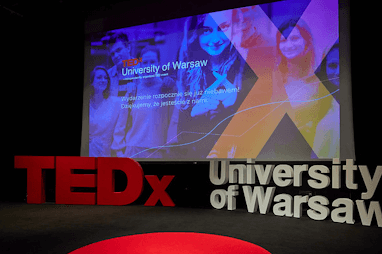TEDx University of Warsaw 2023

06 07 2023
This year’s edition of the TEDx conference at the University of Warsaw on 30.06.2023 was marked by topics including biotechnology, ecology, economics, bioethics, law and archaeology.
The conference, financed by Action V.3.4 “UW – a favourable place for conducting ground-breaking research”, enabled 13 speakers – researchers at the beginning of their scientific journey, including representatives from UW’s doctoral schools – to present innovative ideas and solutions. Participants talked about what they can learn about people by conducting scientific projects and how the information they gain can shape the future:
- dr Zbigniew Szkop, Faculty of Economic Sciences („Drzewa to czysty zysk!” / “Trees are pure profit!”) – talked about why urban trees should be seen as a worthwhile investment and not an unnecessary expense;
- Maria Kubara, Doctoral School of Social Sciences („Po co nam przerwy kawowe?” / “Why do we need coffee breaks?”) – explained why start-ups “flock together” and how this relates to the essence of coffee breaks;
- Adam Budziszewski, Doctoral School of Humanities („Jak przestałem obawiać się śmierci? Moja naukowa terapia z kośćmi” / “How did I stop fearing death? My scientific therapy with bones”) – talked about how long people have burned their dead as part of funerary rites and what information a bioarchaeologist can glean from burnt bone fragments;
- Ibrahim Mertcan Alcinkaya, Doctoral School of Humanities („The superpower of comics: how comics celebrate violence”) – questioned whether superhero comics are just for entertainment or whether they can also address social realities;
- Barbara Krzyżewska, Doctoral School of Social Sciences („Zgoda na nieśmiertelność” / “Consent to immortality”) – featured the story of Henrietta Lacks, whose cancer cells gave rise to HeLi, the first line of immortal human cells;
- Zuzanna Ruszkowska, Doctoral School of Exact and Natural Sciences („Czy fusy po kawie mogą pomóc w walce ze zmianami klimatycznymi?” / “Can coffee grounds help in the fight against climate change?”) – showed how what seems to us to be completely unnecessary, i.e. organic waste, can become an industrial alternative to fossil fuels through the use of, among other things, micro-organisms;
- Martyna Dudziak-Kisio, Doctoral School of Social Sciences („Srebrna (r)ewolucja!” / “Silver (r)evolution!”) – challenged stereotypes about the lives of older people;
- Magdalena Grabowska, Interdisciplinary Doctoral School („Jak media społecznościowe powstrzymują nas od bycia szczęśliwszymi?” / “How is social media stopping us from being happier?”) – argued why the pursuit of increasing wealth will not make people long-term happy, but can only distract from the true sources of long-term happiness;
- Aleksandra Grzegorska, Interdisciplinary Doctoral School („Co Cię gryzie od środka” / “What’s bothering you on the inside”) –revealed what secrets of modern humans future generations of palaeoparasitologists might learn;
- Marianna Iaroslavsk, Doctoral School of Social Sciences („Metaverse: is the law ready for it?”) – presented its solution to the lawlessness and lack of courts in the Metaverse reality;
- dr Piotr Okniński, Faculty of History („Powszechna historia Polski?” / “A common history of Poland?”) – spoke about why the proliferation of historical narratives – which often puts us in a state of confusion and even existential anxiety – can at the same time be crucial to the development of new, inclusive models of social sensitivity, based on the affirmation of diversity;
- dr Ada Górna, Faculty of Geography and Regional Studies („Czy uratują nas rzodkiewki na balkonie? Czyli o rolnictwie miejskim w obliczu kryzysów” / “Can radishes on the balcony save us? Or urban agriculture in the face of crises”) – told the story of productive cities and how agriculture can change our urban future;
- Kinga Stępniak, Doctoral School of Exact and Natural Sciences („Wilcza natura psów” / “The wolf nature of dogs”) – argued why it is important to be your dog’s best friend and improve its relationship with wildlife.
This year’s edition of TEDx at the UW (the second organised by the Center for Cooperation and Dialogue) was held under the patronage of UW Rector Professor Alojzy Z. Nowak. The media patron of the event was Academic Radio Kampus.
Photos from the event
(photo: Krystian Szczęsny / University of Warsaw / CC BY-NC-ND 2.0.)